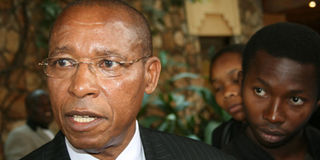Mutula criticised for remarks on ICC Kenya probe

Fredrick Onyango | NATION. Justice Minister Mutula Kilonzo (pictured) on Sunday came under immense criticism for suggesting that with the passage of new constitution and new institutions to follow, post-election violence suspects can be handled at home.
Justice Minister Mutula Kilonzo on Sunday came under immense criticism for suggesting that with the passage of new constitution and new institutions to follow, post-election violence suspects can be handled at home.
Civil society leaders said the minister’s latest affront on the International Criminal Court is reaffirmation of betrayal of commitment to end impunity for human rights atrocities in Kenya.
“It further exposes the depth and extent of a well knit choreographed political scheme being played by powerful forces within the government which affects not just the justice for post-election violence but also the Truth Commission and the implementation of the Constitution,” International Centre for Policy and Conflict executive director Ndung’u Wainaina said.
He added: “It is outrageous. It is something to make every Kenyan get worried on the Government’s commitment to justice for post-election violence victims and correct implementation of the Constitution.
In an exclusive interview with our sister publication the Sunday Nation, Mr Kilonzo, whose docket is crucial for ensuring justice to post election violence victims said the new laws would strengthen the judiciary and police to deal with the chaos that left 1,133 people dead and more than 600,000 uprooted from their homes.
Kenya National Commission on Human Rights commissioner Hassan Omar said the statement raised questions over Government’s commitment to the ICC process, just weeks after it attracted local and international spat by inviting wanted Sudan President Omar Bashir to attend the promulgation of new constitution.
Mr Omar said Mr Kilonzo’s remarks symbolize the Government’s slow diversion from respecting and cooperating with the court as political re-alignment emerge ahead of 2012 elections.
The statement, Mr Omar warned, would not to augur well for Kenya internationally, its democracy and efforts to fight impunity.
Mr Omar said the ICC process is irreversible, adding that Mr Mutula’s assertion shows the Government invitation of Mr Bashir was deliberate.
He said it will take two to three years before the new constitution starts functioning well, a thing that if relied on could delay justice to victims and perpetrators of the violence.
“There’s absolutely no basis for substituting the ICC with the new constitution. The process must go on,” Mr Omar said.
He said some perpetrators of the skirmishes have been strategising to delay the ICC process and warned “any further delay will be a miscarriage of justice.”
Mr Omar said it is almost three years since the killings occurred and that it is important that the efforts to attain justice is speeded up.
Nominated MP George Nyamweya said Mr Kilonzo “could be having some point as the country needs to reconcile, unite and find its own solutions to local problems.”
He, however, said it is up to the whole country or the coalition government to decide and make it clear whether it wants to proceed with the ICC process.
Mr Nyamweya said victims of the skirmishes need to be compensated and that the incident “could not just be wished away.”
Supreme Council of Kenya Muslims secretary general Adan Wachu said Mr Kilonzo should “stop goofing as he normally does on all national and international issues.”
“The new constitution he talked about requires that Kenya abides by all international rules it has signed,” Mr Wachu said.
The secretary general reminded Mr Kilonzo that Kenya is a signatory to the Rome Statute “and the minister as a senior counsel should know better.”
“ICC does not try riots, stealing, assault, arson and petty crimes as demanded by Mutula. The minister should stop the usual diversionary tactics by Kenyan leaders. His statement shows something must be cooking,” Mr Wachu said.
The ICC authorised chief prosecutor Luis Moreno-Ocampo to start investigations on the 2007 post-election violence in March.
The names of some prominent politicians, government officials and businessmen suspected to have organised and funded violence are believed to be in list presented to the ICC by the Waki Commission which looked into the chaos.
A number of politicians suspected to be in the list enjoy large ethnic following and are interested in vying for presidency in 2012.




